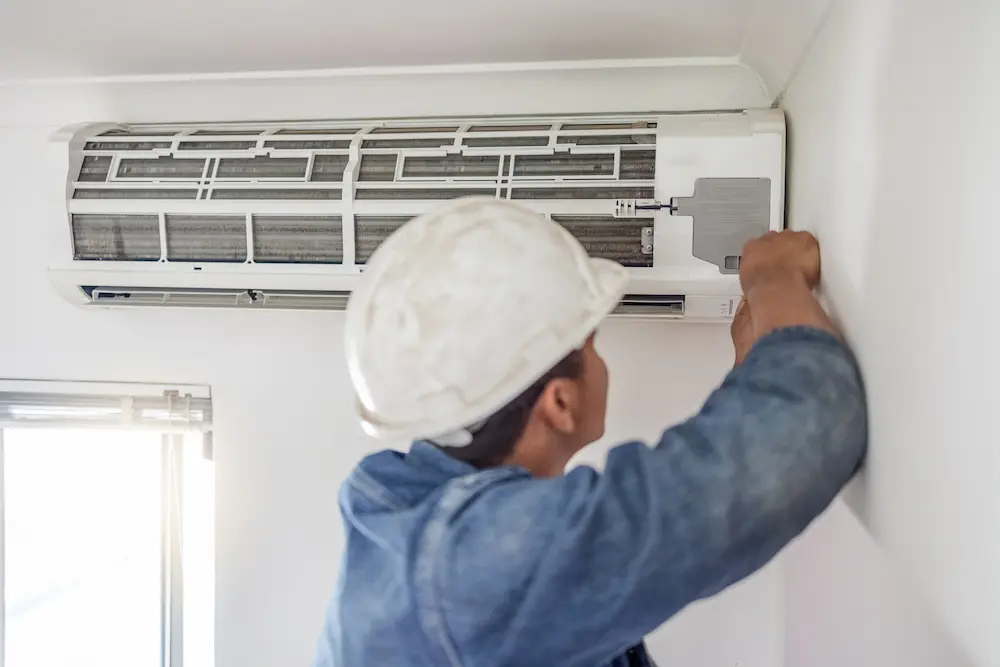A healthy workplace environment is imperative for the well-being and productivity of employees. One key aspect that often gets dismissed is the quality of the air circulating in the office. Poor air quality can potentially lead to numerous health issues like respiratory issues, allergies, and even decreased cognitive function.
To ensure a healthy workplace for everyone, it is essential to prioritize HVAC maintenance. The HVAC system is critical in regulating indoor air quality. In this blog post, you’ll be provided valuable tips to help you maintain healthy and optimal air quality in your workplace.
- Regular Filter Replacement
One of the simplest yet most effective ways to maintain good air quality is by regularly replacing HVAC filters. These filters trap dust, pollen, allergens, and even microorganisms, preventing them from circulating in the air. To ensure optimal performance, replace filters every 1 to 3 months. This practice not only improves air quality but also enhances the efficiency of the HVAC system, lowering energy consumption.
- Check For Potential AC Ice Buildup
AC ice buildup can compromise both air quality and HVAC efficiency. Check your system’s evaporator coil and ensure it’s clean. Insufficient airflow due to a dirty coil can lead to ice formation. If you notice ice buildup, turn off the AC and let it thaw. Additionally, promptly address any refrigerant issues, as low refrigerant levels can contribute to ice accumulation.
- Schedule Regular HVAC Inspections

Regular inspections by qualified technicians are imperative to keep your HVAC system running smoothly. These inspections can identify potential issues before they escalate, saving both time and money. Technicians will check for leaks, assess refrigerant levels, and inspect electrical components. Ideally, consider a biannual maintenance schedule before the cooling and heating seasons to ensure your HVAC system remains in top condition year-round.
- Schedule Professional Ductwork Cleaning
Over time, dust, mold, and debris can accumulate in the HVAC ductwork, becoming a breeding ground for allergens and pollutants. Periodic duct cleaning removes these contaminants and improves indoor air quality. A professional cleaning every 3 to 5 years is recommended. Clean ducts not only enhance air quality but also allow for better airflow, optimizing the system’s efficiency.
- Control Humidity Levels
Maintaining the right humidity levels in your workplace isn’t just about comfort; it’s also about ensuring a healthy indoor environment. Your HVAC system should include humidity control features to make it easier to control the room’s humidity. Humidity control plays a significant role in creating an inhospitable environment for pollutants that can degrade air quality and impact employee well-being.
High humidity can trigger mold growth, dust mites, and other allergens. On the other hand, low humidity can cause dryness in the respiratory tract and eyes, making occupants more susceptible to infections. Thus, you must maintain humidity levels between 30% and 50%. Within this range, the growth of mold and dust mites is inhibited, reducing the potential for allergens to circulate through the air.
- Check For Proper Sealing and Insulation
A well-insulated workplace not only conserves energy but also ensures that outdoor pollutants stay out and indoor air remains clean. Regularly inspect doors and windows for gaps and seal any leaks promptly. Proper insulation prevents drafts and keeps temperature fluctuations to a minimum, reducing the workload on your HVAC system and prolonging its life.
- Upgrade Thermostats or Opt For Smart Thermostats
Maintaining an optimal temperature is essential for a comfortable and healthy workspace. Extreme temperatures can lead to discomfort and stress among employees. Moreover, improper temperature regulation can impact air quality. High temperatures can contribute to increased humidity, encouraging the growth of mold and dust mites. On the other hand, overly cold environments can lead to a lack of proper ventilation, trapping pollutants indoors.
Upgraded thermostats, particularly programmable and smart variants, are modern solutions that can significantly improve HVAC efficiency, enhance temperature control, and promote a healthier and more pleasant working environment. These devices allow precise control over temperature settings, reducing energy consumption during off-hours. Smart thermostats can even learn patterns and adjust settings accordingly. Having this level of control can also help save you money from high energy bills.
- Ensure Proper Ventilation
Proper ventilation is vital to preserving good indoor air quality. Stale air can harbor pollutants and contaminants. HVAC systems equipped with ventilation mechanisms bring in fresh outdoor air and circulate it indoors. Regularly inspect these systems to ensure they function optimally. Enhancing ventilation helps reduce the concentration of indoor pollutants and contributes to a healthier workspace.
Wrap Up
When designing a modern office, you must ensure optimal air quality in the workplace for the health and well-being of employees. With these HVAC maintenance tips, you can significantly boost the air quality in the workplace, reduce health risks, and create a more productive and comfortable environment for everyone. Start prioritizing HVAC maintenance today to reap the long-term benefits it brings to your workplace.

